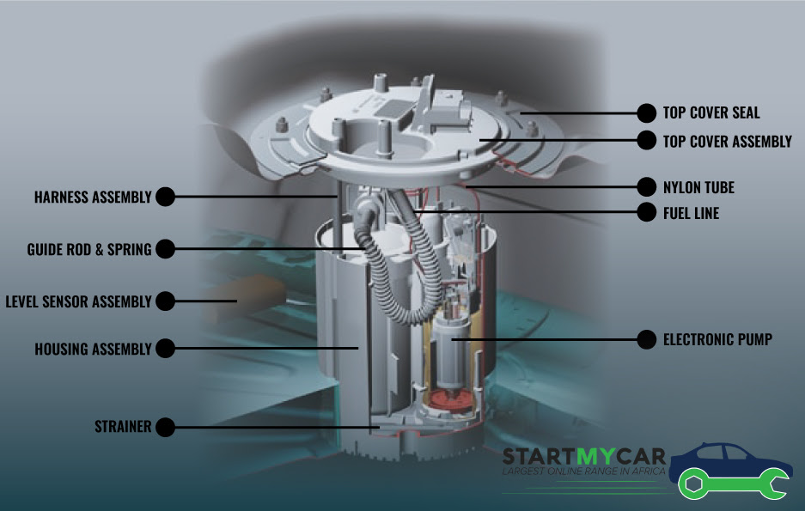Identifying common fuel pump issues can be crucial for maintaining your vehicle’s performance and preventing breakdowns. From poor fuel economy to engine misfires, understanding these issues is essential for timely repairs.
Your vehicle’s fuel pump is a critical component that ensures the proper flow of fuel to the engine. However, over time, it can develop various issues that can affect your vehicle’s performance and efficiency. By recognizing the common signs of fuel pump problems, you can address these issues early and avoid potential breakdowns.
This comprehensive guide will walk you through the most common fuel pump issues, their symptoms, and the necessary steps for troubleshooting and repairs. Understanding these issues will empower you to take proactive measures to keep your vehicle running smoothly and efficiently.
Importance Of Fuel Pump In Vehicle Performance
Fuel pump is vital for optimal vehicle performance, ensuring proper fuel delivery to the engine. This comprehensive guide helps in identifying common fuel pump issues that can impact overall drivability and efficiency. Proper maintenance and timely repairs are crucial for sustaining peak performance.
Function Of The Fuel Pump
The function of the fuel pump in a vehicle is to deliver the right amount of fuel to the engine at the correct pressure. Fuel pumps are responsible for pumping fuel from the gas tank to the engine, ensuring that the engine receives a steady and consistent supply of fuel for optimum performance. The fuel pump also filters the fuel as it passes through to prevent any impurities or particles from reaching the engine. It works in conjunction with other components of the fuel system, including the fuel filter and fuel injectors, to ensure a smooth and efficient fuel delivery process.Significance Of Proper Fuel Pump Function
Proper fuel pump function is crucial for the overall performance and efficiency of a vehicle. When the fuel pump is working correctly, it helps maintain the ideal fuel pressure required for the engine to run smoothly. This ensures that the engine receives the right amount of fuel for combustion, allowing it to generate the necessary power to propel the vehicle forward. When the fuel pump malfunctions or fails, it can cause various issues that affect the vehicle’s performance. Some common problems include:- Engine misfiring
- Poor acceleration
- Stalling or difficulty starting the engine
- Engine hesitation or sputtering
- Inconsistent fuel delivery
- Poor fuel economy
In Conclusion,
Proper fuel pump function is vital for a vehicle’s overall performance. In order to prevent fuel pump issues and maintain a well-functioning fuel system, it is important to monitor and address any signs of fuel pump malfunction promptly. Regular maintenance and inspections can help identify and rectify any fuel pump problems before they escalate and cause more significant issues.
Credit: www.waterheatersnow.com
Symptoms Of Fuel Pump Problems
Fuel pump problems can cause various issues in a vehicle, making it crucial to spot the symptoms early to prevent further damage. Here are the common indicators of fuel pump issues to be aware of:
Engine Misfires
One of the telltale signs of a faulty fuel pump is engine misfires, often resulting from inadequate fuel reaching the engine. Sputtering, hesitation, and jerking during acceleration are clear indications of this issue. If left unaddressed, it can lead to more severe engine damage.
Sudden Loss Of Power
Experiencing a sudden loss of power while driving can be a direct consequence of fuel pump malfunction. It causes inconsistent fuel supply to the engine, leading to insufficient power generation and acceleration, thereby impacting the overall vehicle performance.
Difficulty Starting The Engine
Struggling to start the engine, especially after the vehicle has been sitting for a while, is a common symptom of fuel pump problems. Inadequate fuel pressure due to a malfunctioning pump can lead to difficulty in initiating the combustion process, resulting in prolonged cranking before the engine starts.
Common Causes Of Fuel Pump Failure
Fuel pump failure can cause significant issues in a vehicle, leading to stalling and a lack of power. Identifying the common causes of fuel pump failure is crucial for maintaining a properly functioning fuel system. Understanding these causes can help anticipate potential problems and take preventive measures, ensuring your vehicle operates efficiently. Below, we examine the common causes of fuel pump failure and how each issue impacts the performance of your vehicle.
Contaminated Fuel
Contaminated fuel, often containing impurities such as dirt, rust, or debris, can lead to fuel pump clogging and reduced performance. The presence of contaminants can restrict proper fuel flow, leading to increased wear and tear on the pump and potentially causing it to fail prematurely.
Excessive Wear And Tear
Excessive wear and tear on the fuel pump can result from prolonged use or exposure to contaminated fuel. Over time, the pump’s components may deteriorate, leading to a decrease in performance and ultimately failure. Regular maintenance and periodic replacement of fuel filters can help mitigate excessive wear and tear.
Electrical Issues
Electrical issues, such as corroded connectors or faulty wiring, can disrupt the fuel pump’s operation, leading to irregular fuel delivery and potential failure. Ensuring the proper functioning of the vehicle’s electrical system is essential in preventing fuel pump issues.
Diagnosing Fuel Pump Issues
Diagnosing fuel pump issues is crucial in order to efficiently troubleshoot and resolve any problems with your vehicle’s fuel system. By identifying common fuel pump issues early on, you can avoid costly repairs and ensure smooth and reliable performance. In this comprehensive guide, we will explore two essential diagnostic methods: using a fuel pressure gauge and checking fuel filters.
Using A Fuel Pressure Gauge
One of the most effective ways to diagnose fuel pump issues is by using a fuel pressure gauge. This tool allows you to measure the pressure of the fuel being delivered to the engine. By comparing the measured pressure to the manufacturer’s specifications, you can determine if the fuel pump is functioning properly.
To use a fuel pressure gauge, follow these steps:
- Locate the fuel pressure test port on the fuel rail or fuel line. The exact location may vary depending on your vehicle’s make and model.
- Insert the fuel pressure gauge’s fitting into the test port and secure it tightly.
- Start the engine and let it run for a few minutes to build up pressure.
- Observe the reading on the fuel pressure gauge. It should match the recommended pressure range specified by the manufacturer.
- If the measured pressure is significantly below or above the recommended range, it indicates a potential fuel pump issue.
Checking Fuel Filters
Fuel filters play a crucial role in keeping the fuel system clean and free from debris. Over time, these filters can become clogged or contaminated, compromising the performance of the fuel pump. Regularly checking and replacing fuel filters is essential to ensure optimal fuel flow and prevent fuel pump issues.
Here’s how you can check your fuel filters:
- Locate the fuel filter, which is typically installed along the fuel line, either under the vehicle or in the engine compartment.
- Carefully inspect the fuel filter for any signs of clogging, such as dirt, debris, or discoloration.
- If the fuel filter appears dirty or clogged, it is recommended to replace it with a new one. Refer to your vehicle’s manual for specific instructions.
- After replacing the fuel filter, it is advisable to perform a fuel pressure test using a fuel pressure gauge to ensure proper fuel flow and pressure.
By regularly diagnosing fuel pump issues using a fuel pressure gauge and checking fuel filters, you can mitigate potential problems and keep your vehicle running smoothly. Remember to always consult your vehicle’s manual and seek professional assistance if needed for accurate diagnosis and repairs.
Preventive Maintenance And Solutions
Proper preventive maintenance is crucial in ensuring the reliable performance of your fuel pump. By implementing effective solutions, you can prevent common issues that may arise. Here are some key practices to follow:
Regular Fuel System Inspections
- Inspect fuel system for leaks or damage.
- Check for any unusual noises coming from the fuel pump.
- Ensure all connections are secure and no signs of corrosion are present.
Using High-quality Fuel
- Opt for premium fuel to reduce contaminants.
- Avoid mixing different fuel grades to maintain pump efficiency.
- Consult your manufacturer’s guidelines for recommended fuel type.
Replacing Fuel Filters Regularly
- Change fuel filters at recommended intervals.
- Clogged filters can strain the fuel pump.
- Ensure proper installation of new filters for optimal performance.
Credit: catused.cat.com

Credit: www.startmycar.co.za
Frequently Asked Questions Of Identifying Common Fuel Pump Issues: A Comprehensive Guide
How Can A Faulty Fuel Pump Be Identified?
A faulty fuel pump can be identified by common symptoms like engine sputtering, loss of power, difficulty starting, and unusual noises coming from the fuel tank. Additionally, a drop in fuel pressure and poor fuel economy can also indicate a faulty fuel pump.
What Is An Indicator Of Fuel Pump Issues?
A common indicator of fuel pump issues includes engine sputtering and stalling. If you experience difficulty with starting, decreased power, or surging while driving, it may indicate a problem with the fuel pump. Additionally, unusual noises from the fuel tank area are also a sign of potential issues.
How Does A Mechanic Diagnose A Bad Fuel Pump?
A mechanic diagnoses a bad fuel pump by checking fuel pressure, inspecting for electrical issues, and monitoring fuel pump performance. They may also conduct a fuel pump relay test and a fuel pump voltage test to pinpoint the issue accurately.
Will A Code Reader Detect A Bad Fuel Pump?
A code reader cannot directly detect a bad fuel pump. It can only diagnose problems related to the engine’s performance.
Conclusion
Identifying fuel pump issues is crucial for maintaining the proper functioning of your vehicle. This comprehensive guide has shed light on common problems, from loss of power to engine misfires, and provided effective solutions. By monitoring your fuel system regularly and addressing any issues promptly, you can avoid costly repairs and ensure a smooth ride.
Take charge of your vehicle’s performance and keep it running smoothly by staying vigilant and knowledgeable about common fuel pump issues.
